Futures of Entertainment Podcasts
/This will be my last post of 2007, barring unforeseen circumstances. The blog is going to go down for a little bit to allow us to switch servers and hopefully provide better service in the future. The blog is also going down because I am exhausted from the term, want to spend time with my family, and need to catch up on other writing and regroup my thoughts so that I have interesting things to share with you all when I return next year. Before I sign off though, I wanted to let you know that the podcasts of the Futures of Entertainment 2 conference are slowly but surely being posted on the CMS homepage. So far, the following podcasts have appeared:
Opening Remarks by Joshua Green and myself, laying out what we see as some of the most important media trends of the past year.
Panelists: Bruce Leichtman, Leichtman Research Group; Stacey Lynn Schulman, Turner Broadcasting; Maury Giles, GSD&M Idea City
As media companies have come to recognize the value of participatory audiences, they have searched for matrixes by which to measure engagement with their properties. A model based on impressions is giving way to new models which seek to account for the range of different ways consumers engage with entertainment content. But nobody is quite clear how you can "count" engaged consumers or how you can account for various forms and qualities of engagement. Over the past several years, a range of different companies have proposed alternative systems for measuring engagement. What are the strengths and limits of these competing models? What aspects of audience activity do they account for? What value do they place on different forms of engagement?
Panelists: Mark Deuze, Indiana University; Catherine Tosenberger, University of Florida; Jordan Greenhall, DivX; Elizabeth Osder, Buzznet; Raph Koster, Areae
There is growing anxiety about the way labor is compensated in Web 2.0. The accepted model -- trading content in exchange for connectivity or experience -- is starting to strain, particularly as the commodity culture of user-generated content confronts the gift economy which has long characterized the participatory fan cultures of the web. The incentives which work to encourage participation in some spaces are alienating other groups and many are wondering what kinds of revenue sharing should or could exist when companies turn a profit based on the unpaid labor of their consumers. What do we know now about the "architecture of participation" (to borrow Kevin O'Reilly's formulation) that we didn't know a year ago? What have been the classic mistakes which Web 2.0 companies have made in their interactions with their customers? What do we gain by applying a theory of labor to think about the invisible work performed by fans and other consumers within the new media economy?
And don't miss the webcast of the MIT Communications Forum event, Forum: NBC's Heroes: "Appointment TV" to "Engagement TV"?
The fragmenting audiences and proliferating channels of contemporary television are changing how programs are made and how they appeal to viewers and advertisers. Some media and advertising spokesman are arguing that smaller, more engaged audiences are more valuable than the passive viewers of the Broadcast Era. They focus on the number of viewers who engage with the program and its extensions -- web sites, podcasts, digital comics, games, and so forth. What steps are networks taking to prolong and enlarge the viewer's experience of a weekly series? How are networks and production companies adapting to and deploying digital technologies and the Internet? And what challenges are involved in creating a series in which individual episodes are only part of an imagined world that can be accessed on a range of devices and that appeals to gamesters, fans of comics, lovers of message boards or threaded discussions, digital surfers of all sorts? In this Forum, producers from the NBC series Heroes will discuss their hit show as well as the nature of network programming, the ways in which audiences are measured, the extension of television content across multiple media channels, and the value producers play on the most active segments of their audiences.
Keep an eye on the Comparative Media Studies Program Home page and the Futures of Entertainment 2 Conference website for the roll out of the other conference podcasts.

























